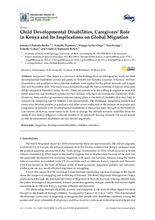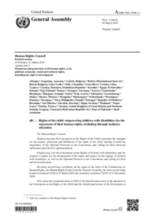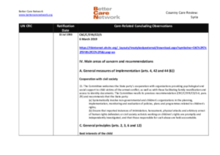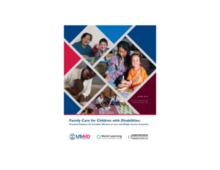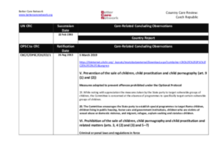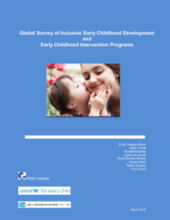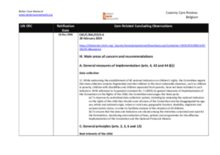Displaying 201 - 210 of 494
This paper is a summary of the findings from an ethnographic study on child developmental disabilities conducted partly in Nairobi and Kiambu Counties in Kenya.
This Resolution on "empowering children with disabilities for the enjoyment of their human rights" was adopted by the UN Human Rights Council on 22 March 2019. The Resolution makes mention of the particular vulnerability of children with disabilities to institutionalization, reaffirms the importance of a family environment for all children, and calls upon States to provide necessary support services to children and families so as to prevent institutionalization and family separation, encouraging States to "undertake every effort to provide alternative care within the wider family and, failing that, within the community in a family setting" where the immediate family is unable to care for the child.
Presented at the UN Human Rights Council side event on Promoting Quality Alternative Care for Children with Disabilities on 5 March 2019, this video highlights the work of ABLE, a program of the Cambodian NGO Children in Families that provides inclusive family-based care for children with disabilities.
Sreyny Sorn, manager of the ABLE Project at Children in Families, gave a presentation at a side event at the United Nations Human Rights Council in Geneva on 5 March, 2019.
This country care review includes the care-related Concluding Observations adopted by the Committee on the Rights of the Child. The Committee's recommendations on the issues relevant to children's care are highlighted, as well as other care-related concluding observations, ratification dates, and links to the Universal Periodic Review and Hague Intercountry Adoption Country Profile.
This presentation of Family Care for Children with Disabilities: Practical Guidance for Frontline Workers in Low- and Middle-Income Countries was given at the UN Human Rights Council Side Event on Promoting Quality Alternative Care for Children with Disabilities on 5 March 2019.
This country care review includes the care-related Concluding Observations adopted by the Committee on the Rights of the Child and the Committee on the Rights of Persons with Disabilities. The Committees' recommendations on the issues relevant to children's care are highlighted, as well as other care-related concluding observations, ratification dates, and links to the Universal Periodic Review and Hague Intercountry Adoption Country Profile.
Child Rights Connect delivered a written and oral statement to the UN Human Rights Council on 4 March 2019 at an event to promote the empowerment of children with disabilities to enjoy their full human rights, including through inclusive education. In the statement, Child Rights Connect says that children with disabilities "are much more likely to grow up in alternative care and face heightened risk of violence."
This report presents the findings of a global survey designed to map current implementation of Inclusive Early Childhood Development (IECD) and Early Childhood Intervention (ECI) programs, among other objectives, and outlines recommendations based on those findings.
This country care review includes the care-related Concluding Observations adopted by the Committee on the Rights of Persons with Disabilities and the Committee on the Rights of the Child as part of the Committees' examinations of the initial State reports.

